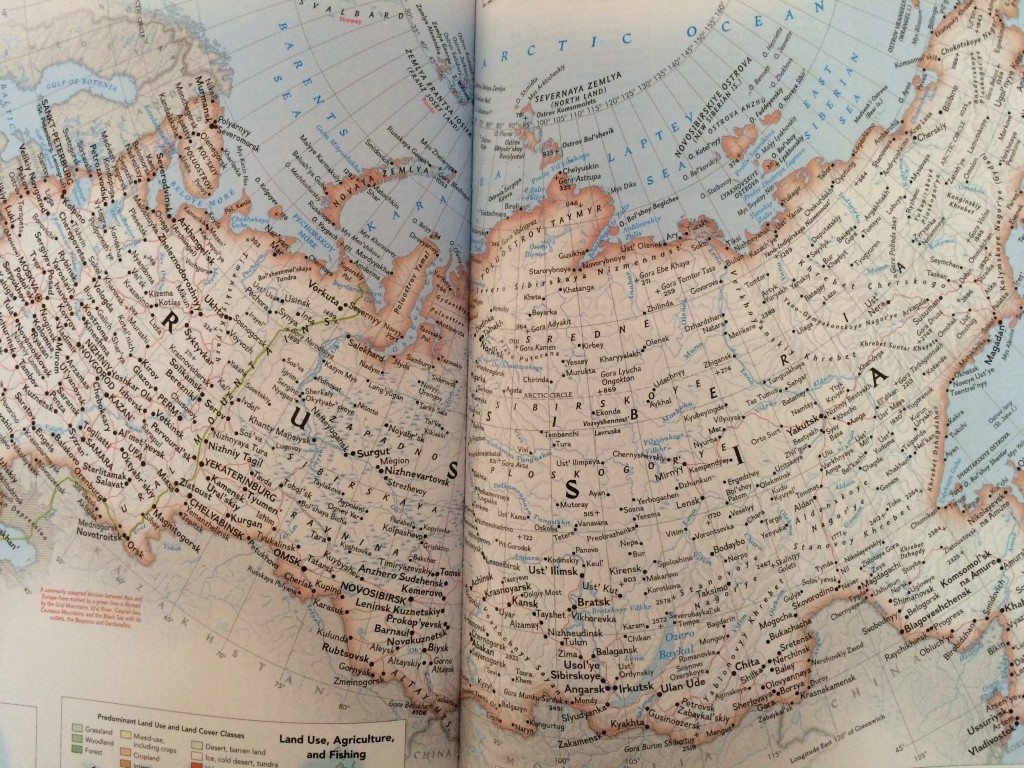 As we wrap up our month of featuring “All Things Russia,”* we note with due attention, and perhaps a bit foreboding, a recent article in the Wall Street Journal entitled: “Putin the Improviser” (Feb. 20, 2015).
As we wrap up our month of featuring “All Things Russia,”* we note with due attention, and perhaps a bit foreboding, a recent article in the Wall Street Journal entitled: “Putin the Improviser” (Feb. 20, 2015).
Boldly declaring that “the Ukraine crisis is even scarier than you think”, WSJ reporter Andrew Weiss reports that Western leaders are struggling to “get inside the head of” Mr. Putin in an attempt to understand a man who seems set on “dragging much of the West into a new Cold War.”
“Putinologists”, as Mr. Weiss explains, are trying to:
“decode Moscow’s intentions through painstaking analyses of the Russian leader’s every public utterance or symbol-laden photo op; they comb through minute aspects of Mr. Putin’s career and private life; they sift for clues in the output of Russia’s sprawling state propaganda apparatus.”
This isn’t the first time that the West has been befuddled by the behavior, thinking and motivations of a leader of the Russian Federation or the Union of Soviet Socialist Republics (USSR). In fact, we can’t help but note an eerie similarity between Mr. Putin and late president of the Soviet Union, Nikita Khrushchev, whose visit to the United States in 1959 provoked the U.S. government to hire a team of 20 psychologists and psychiatrists to better understand his erratic behavior.
But, even with a team of human behavior experts, Khrushchev – much like Putin– remains largely a mystery. Indeed, historians today are still debating Khrushchev’s underlying intentions and foreign policy, specifically in relation to his decision to issue the Berlin Ultimatum of 1958 (in which he demanded that the U.S., Great Britain and France pull their forces out of West Berlin; this ultimatum was ultimately responsible for the creation of the Berlin Wall in 1961).
Historian and author William Taubman, in his book Khrushchev: The Man and His Era (which we highlight here), ultimately suggests that Khrushchev’s highly impulsive, unpredictable and spontaneous personality enabled him to take foreign policy risks – such as the ultimatum and Cuban Missile Crisis in 1963 – without developing a well-constructed, thoughtful plan.
Similarly, while Putinologists are, in part, explaining Mr. Putin’s aggression in Ukraine as a broader attempt to reinstate control over the independent countries that once made up the Soviet Union, Mr. Weiss suggests a scarier alternative: that Putin is “winging it”, “…making it up as he goes along,” and exhibiting a “pattern of damn-the-consequences, trial-and-error improvisation.”
Providing an in-depth analysis of Putin’s behavior and actions, beginning with the collapse of the regime of Ukrainian President Viktor Yankukovych last year, Mr. Weiss makes a profoundly compelling point, concluding that:
“Mr. Putin’s efforts look more like a short-term tactical play than a carefully considered embrace of an ethnocentric approach to defending Russia’s declared interests in its neighborhood.”
And, ultimately, that:
“Mr. Putin’s highly personalized, profoundly erratic approach to governing and waging a deadly war in the heart of Europe suggests that the Ukraine crisis may be even more dangerous than most Western governments are comfortable admitting.”
But, regardless of what Putin’s true motives are – whether he is fueled by a grand scheme or governed solely by an impulsive, erratic personality – it seems that Mr. Weiss is on to something.
As we’ve explored in our postings*, Russia is very mysterious – its complexity and mystery just as vast and profound as the Russian landscape, permeating throughout its culture, people and even food.
That Khrushchev and Putin have both been described as “impulsive”, “unpredictable”, “spontaneous” and “erratic” seems less of a coincidence than it does of an inherent characteristic of Russian leaders – characteristics that only add to the mystery.
As Mr. Weiss writes:
“Western policy makers must grasp the harsh reality that Mr. Putin’s pattern of impulsive, reckless behavior places him in unwelcome company—namely, alongside his reviled predecessors Boris Yeltsin and Mikhail Gorbachev. Both men were undone by a series of blunders that destroyed their careers and reputations—and, in Mr. Gorbachev’s case, his country. The consequences of the crisis that Mr. Putin has unleashed may be no less grave.”
What makes Putin – and his predecessors – act impulsively and recklessly? I’m not sure we’ll ever know. After all, it has been nearly 80 years since Winston Churchill’s famous address and it seems we still haven’t solved the riddle, unwrapped the mystery or cracked the enigma.
*Seen our other Russian posts? Check them out below:
- “From Russia With Love”
- “Nostrovia!”
- “Vodka: The Russian Spirit”
- “I Can See Russia From Here!”
- “A Glimpse Into Russia’s Imperial Romanov Family”
- “The Colorful, Contradictory, Crazy Comrade Khrushchev”
- “Once Upon a Time in Mari Vanna: A Russian Restaurant”
- “Borscht, Borsch or Borshch?”
- “Tea Time With Podstakanniks on the Russian Railway”
- “‘Pop’ing Into Warhol’s World”
Sometimes I think we ascribe political leaders actions to some thoughtful foresight or deliberate reasoning when in fact they are just ‘winging’ it. And often times we don’t need to dig too deep, the motives and plan are in plain sight… which I believe to be the case here.